I have a pretty accurate body clock. Regardless of when I doze off, I always wake up at the same time.
When I’m at home on my regular schedule, I trust my “internal chronometer” so much, I haven’t set an alarm in years.
When I travel, it’s a completely different story…
It’s a rare occurrence when a flight, train, or even road trip allow me to wake up at my normal time, so I rely on an alarm clock.
In fact, I’ll let you in on a little secret: I’m a nervous Nellie when I’m forced to break my sleep cycle to catch an early flight. My fear of missing a flight may even border on paranoia–I’ll wake up multiple times during the night in a panic unless I feel completely at ease that there’s an alarm system in place to wake me no matter what.
I recently told a friend about this fear and he asked, “Why not just set the alarm on your phone?!”
Simple answer: I don’t trust smart phones and tablets. They’re too complicated with so many nighttime settings, alarm/alert volume levels, short battery life, etc. etc.
Case in point…
Earlier this year, I had to catch an early flight and needed to wake up at 4:00 AM, so I scheduled my iPhone and iPad to alarm at 4:00. (When at home, I try to have my iPhone/iPad wake me first, because the alarm is very gradual and doesn’t disturb my wife.) Of course, I also set my travel radio’s alarm clock for 4:10, as a fail safe.
Knowing I had a total of three(!!!) alarm clocks set, I slept like a baby.
At 4:10 AM, my travel radio alarm started beeping. The iPhone and iPad were completely silent.
Turns out, the iPad decided to do an operating system update during the night. For some reason, after rebooting, it simply forgot about the alarm. (Thanks, iPad!) And the iPhone? I’m still not sure how/why, but the mute switch on the side of the phone was engaged and if it vibrated to wake me, I never heard it rumbling on the night stand.
Thank goodness the travel radio had my back, else I would have missed that flight.
Travel radios: Never leave home without one!
I like to be a self-sufficient traveler even though I only travel with one bag and pack very lightly. I never rely on my destination to have a functioning alarm clock (with battery backup, of course) or effective wake up call service. Regardless of how minimally I pack, I always take a travel radio.
In February, for example, I travelled to Philadelphia for the Winter SWL Fest. Even though my trip was nearly a week long, to keep from paying a carry-on fee with Frontier airlines, I packed everything in a bag that met their strict “personal carry-on” bag size.
Regular readers know I’m a bit of a pack geek, so my bag of choice was the Tom Bihn Stowaway. Here’s the bag fully packed out at my feet in the airport:
Here’s a photo of everything I packed in the Stowaway for that trip:
This particular trip really pushed the limits on my minimalist travel philosophy. Honestly? It was a fun challenge! I had to hone my pack contents down to only the essentials (don’t make fun of me for believing three flashlights were essential–the previous year, our hotel was without power for several days).
Still, I made room for one of the smallest travel radios in my arsenal: the County Comm Marathon ETFR:
I chose the ETFR because it has a custom case that could attach to my belt or pack strap if interior space became too tight. The ETFR radio hasn’t been in production for a decade, but it’s an effective radio companion and the alarm works without fail.
Choosing a travel radio
Most modern digital portables are based on DSP chips that have clock and alarm functions, so you might already own an effective travel radio.
With that said, I always prioritize radio features that benefit a traveler, of course; here are some that I look for:
- Small size: Naturally, it’s sensible to look for a travel radio that’s small for its receiver class for ease in packing.
- Overall sturdy chassis: Any travel radio should have a sturdy body case that can withstand the rigors of travel.
- Built-in Alarm/Sleep Timer functions: We’ve already exhausted this topic, right?.
- Powered by AA batteries: While the newer lithium ion battery packs are fairly efficient, I still prefer the AA battery standard, which allows me to obtain batteries as needed in most settings; a fresh set of alkaline (or freshly-charged) batteries will power most portables for hours on end.
- Standard USB charging cable: If I can charge batteries internally, a USB charging cable can simply plug into my smart phone’s USB power adapter or the USB port on my laptop; no extra “wall wart” equals less weight and less annoyance.
- ETM: Many new digital portables have an ETM function which allow auto-scanning of a radio band (AM/FM/SW), saving what it finds in temporary memory locations–a great way to get a quick overview of stations. (As this function typically takes several minutes to complete on shortwave, I usually set it before unpacking or taking a shower. When I return to my radio, it’s ready to browse.)
- Single-Side Band: While I rarely listen to SSB broadcasts when traveling, I still like to pack an SSB-capable receiver–especially for longer trips.
- RDS: Though an RDS (Radio Data System) is FM-only, it’s a great feature for identifying station call signs and genre (i.e., public radio, rock, pop, country, jazz, classical, etc.)
- External antenna jack: I like to carry a reel-type or clip-on wire external antenna if I plan to spend serious time SWLing. Having a built-in external jack means that the connection is easy, no need to bother with wire and an alligator clip to the telescoping whip.
- Tuning wheel/knob: Since I spend a lot of time band-scanning while travelling, I prefer a tactile wheel or knob for tuning my travel radio.
- Key lock: Most radios have a key lock to prevent accidentally turning a radio on in transit–but with a travel radio, it’s especially important to have a key lock that can’t be accidentally disengaged.
- LED flashlight: Very few radios have this, but it’s handy to have when travelling. Note that the County Comm ETFR (above) does!
- Temperature display: Many DSP-based radios have a built-in thermometer and temperature display; I like this when I travel anytime, but especially when I’m camping.
While I don’t have a portable that meets 100% of the above travel radio wish-list, I do have several that score very highly.
Since this is a favorite topic, I’ve written a number of articles with reviews of travel radios. In my CC Skywave SSB review last year, I list a number of current favorites.
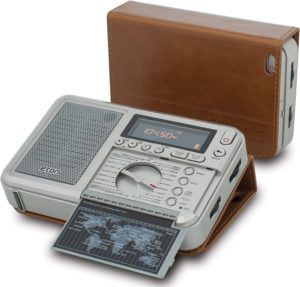 I should also mention that one great deal at time of posting is the Eton Executive Traveler.
I should also mention that one great deal at time of posting is the Eton Executive Traveler.
It’s a brilliant little radio for $34.99 shipped (note this affiliate link supports the SWLing Post).
One of our readers has been following the price of this little radio for months–it’s being sold at an all-time low at present.
What’s in your travel pack?
What’s your favorite travel radio? What features are important to you? Anyone else paranoid about missing early flights?
Do you enjoy the SWLing Post?
Please consider supporting us via Patreon or our Coffee Fund!
Your support makes articles like this one possible. Thank you!

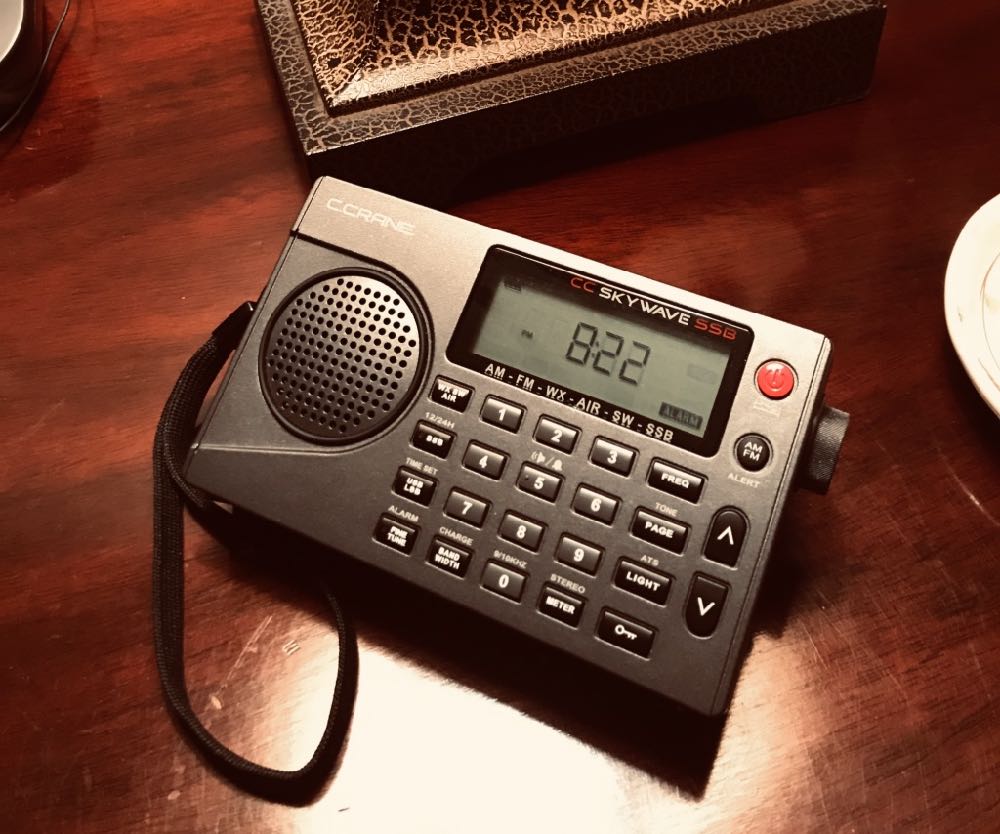
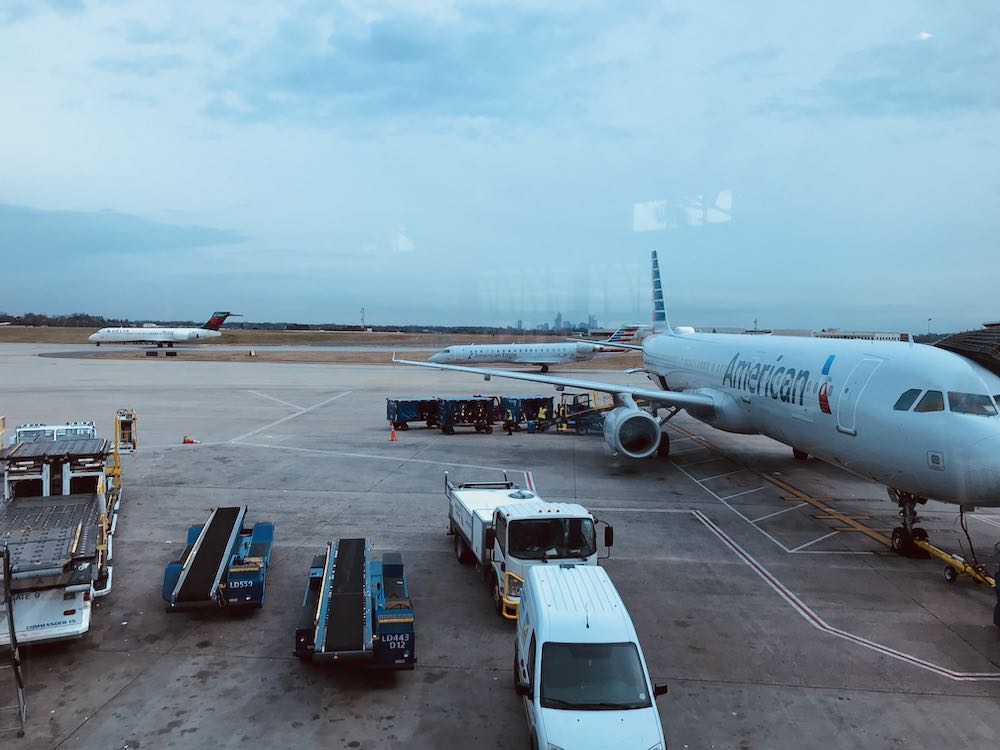
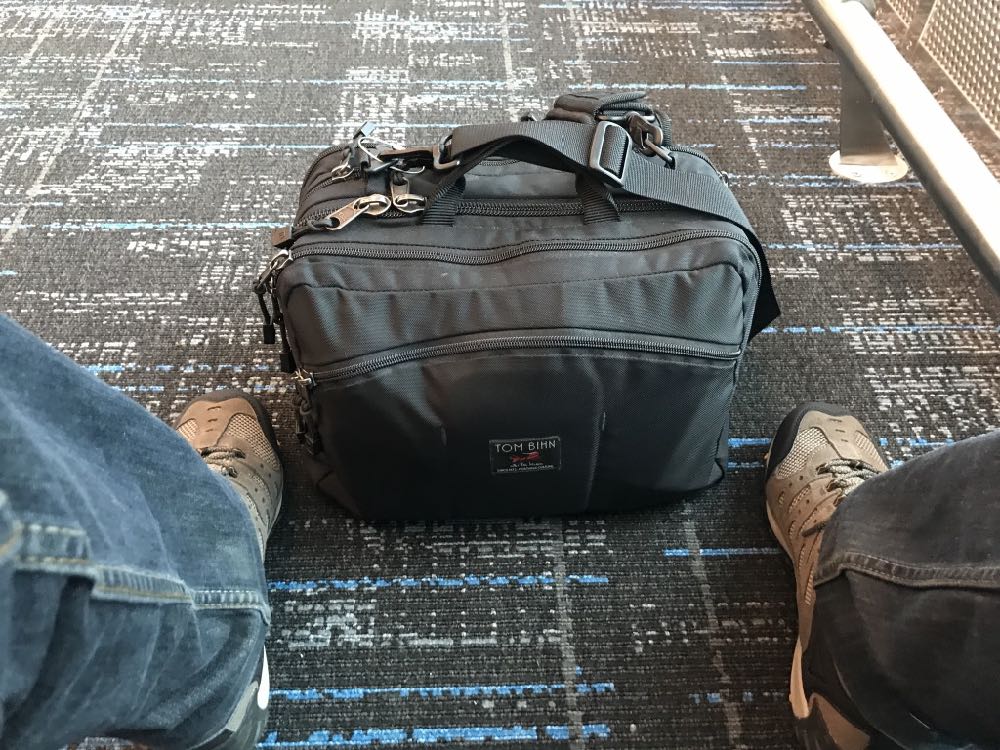
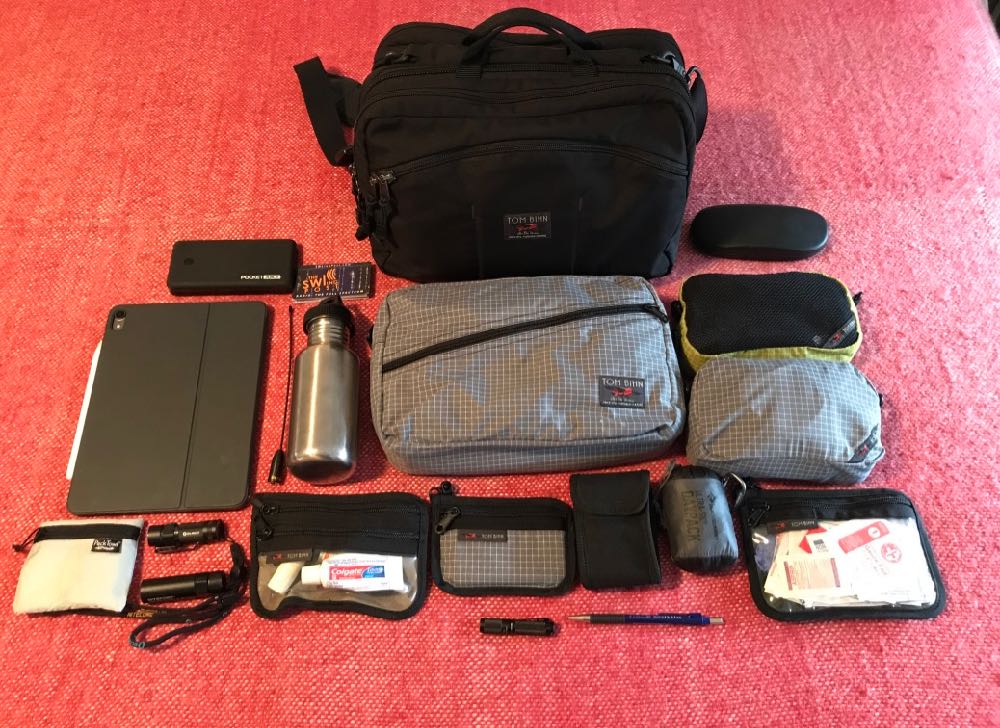
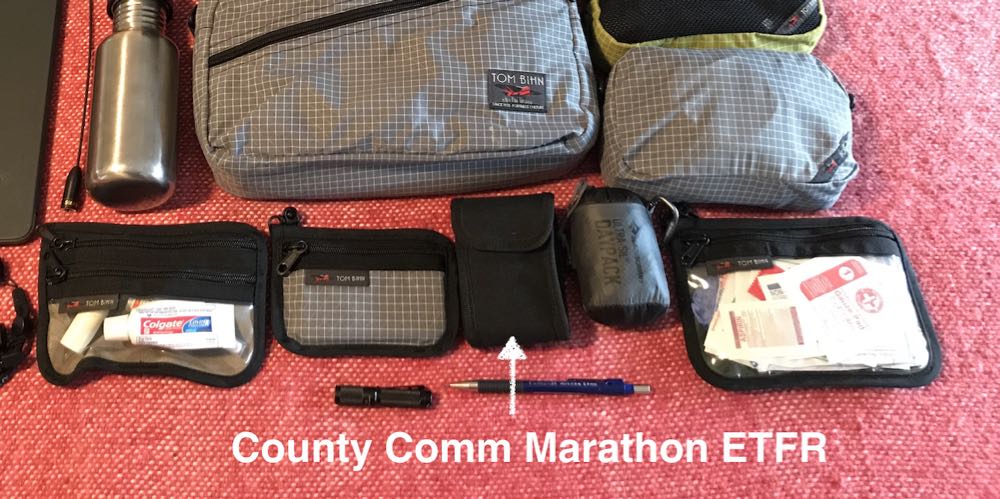
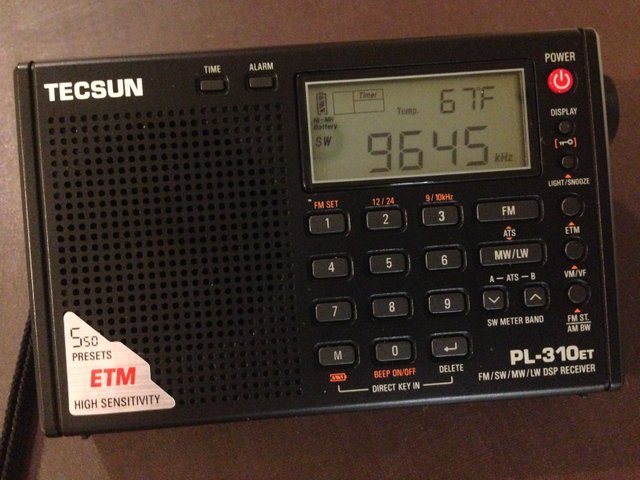
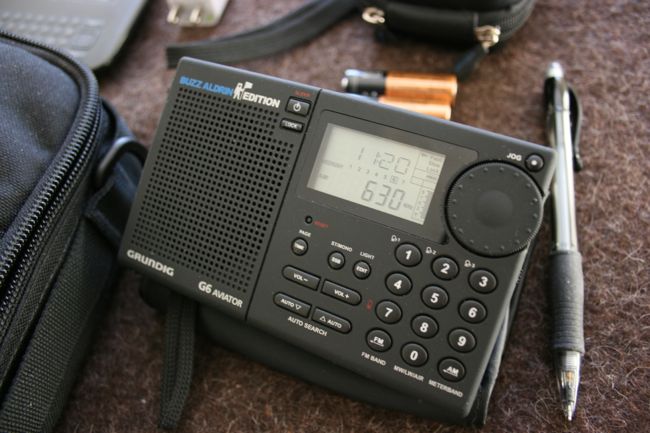

travel radio has to be my tecsun pl-660 especially as it has ssb etc to listen to the ham bands when im miles away from home having a vocation in cuba? able to afford more expensive radio but love the pl-660,have nothing to do with tecsun etc, Jon Collins,Birmingham,uk
The Skywave and Skywave SSB are in my travel bags now, they are compact and perform well.
However, I don’t like them for high rise hotel buildings surrounded by other buildings where one is extremely unlikely to get any MW/SW reception from just about any receiver. If a station you want is available on FM it should be fine though (I prefer talk stations when going to sleep)
For that use case you are better off with a digital receiver if the area/country you are going to has digital stations on air. Or a bluetooth speaker and smartphone both left on charge.
The Sangean PR-D18 (AM/FM) or the DPR-67 (DAB+/FM) would be my choices if SW is not required. The sleep timer and the alarm are just so easy to set/use on these.
I’m very happy with the results of the radio, I am in need of a new S.W. so l maybe ordering one of them as soon as I get it figured out!!!-GARY ????????????????????????????
I would argue strenuously against the Eton Executive Traveler as a travel radio. It has a HUGE flaw in that the “lock” feature doesn’t prevent the back light from coming on every time the tuning or volume dials are so much as bumped. This has meant many a dead battery situation upon arrival at my destination. I suppose if one doesn’t mind taking out the batteries to travel with the radio then this is the perfect travel radio. Otherwise, this is a big pass as a travel radio.
Same problem with the Tecsun PL-660.
All DAB+ receivers tell the time which is accurate. The transmission standard requires the sending of UTC time which comes from GPS receiver at the broadcasters’ encoder. The reason for this is that DAB+ and DRM are both capable of Single Frequency Networking. This requires a common frequency reference betwen the main transmitter and any repeaters which are all on the same channel. So the centre frequency of the chqnnel is divided down to a common frequency generted from the GPS signal.
The receiver settings tell the receiver what offset to add.
The GPS signal is utlimately derived from multiple caesium beam clocks.
Uh, hate to break it to you Alan – but, just like DVB-T which also “requires the sending of UTC time”, the time in DAB+ is not always accurate. As can easily be confirmed e.g. by observation of how they muck it up during daylight savings changeovers.
For example, recently I’ve seen local DAB+ stations not only get it wrong, but get it wrong in *different directions* and by *different odd amounts* e.g. 17 minutes – which shows it wasn’t simply an “offset from UTC” issue. The same used to happen with DVB-T (e.g. the ABC ran 20-odd minutes out of whack, where they had UTC set incorrectly, for months – across a DST changeover too!).
And FWIW, I’ve seen very similar issues with AIR’s SW DRM broadcasts.
You’ve misunderstood the difference between “time” and “timing” in digital broadcasts. Timing needs to be precise and with respect to a known reference. But the actual *time* broadcast doesn’t have to be accurate at all. SFN’s and the like don’t care if the clock is right or wrong – just that they’re all sync’d to a known reference.
You can have a precise timing reference based on “a common frequency reference” “generted from the GPS signal” and “utlimately derived from multiple caesium beam clocks” – but it doesn’t mean it’s broadcasting the right time. That’s ultimately down to the broadcaster’s setting it correctly, as I’ve seen many times & mentioned a few above, they can get that wrong too.
With so many radios comes an equal number of different alarm clock interfaces. The odds of me remembering exactly how to work each one sufficiently well that I can reliably set an alarm when tired is effectively zero. On the other hand, I only have one wristwatch and one smart phone; those I can remember. Practically speaking, I couldn’t care less if any of my radios has a clock.
As a side note, the user interface on the Timex Expedition series watches has been almost unchanged for over 20 years. I can remember how to use that, no matter how jet-lagged out. One-button access to a second time zone is a great feature. Set to Zulu, and it’s all ready to hit the road.
What about a wrist (or pocket if you prefer) watch ? That won’t take luggage space and will cure your anxiety ?
Oh and then, if you pick a mechanical one, you won’t even have to worry about batteries ?
I have a beat-up, 20+ year old YB-400 that I have taken around the world with me. It has two time zones, one of which I keep on UTC and the other for local time. It has alarm clock features, and covers LW, MW, and SW. Nevertheless, it isn’t performing as well as it used to. I suspect many electrolytic capacitors are probably fading away. I may be due for a replacement some day soon.
While it was small and light by the standards of the day, I could always use something smaller and lighter.
I’m gonna wait for the reviews of the PL 990 to see if it might be worth my money.
I require a clock on my multiband portables for SWLing and no other reason. I have a smart phone and a wristwatch for mundane timekeeping.
My requirements for a radio clock are few.
– 24-hour capability so I may set the clock to UTC and leave it there. Setting time manually to WWV audio or equivalent is fine with me. I want to hit top of the hour breaks on shortwave broadcasts reliably.
– Constant visibility. I want the clock on display and visible whenever the radio is powered up. My Sangean ATS-909X and Eton Grundig Edition Satellit do this.
– Ability to store at least three alarm settings.
My gripe with clocks found on these shortwave radios is the poor timekeeping accuracy. I want at least the same accuracy as a inexpensive “quartz” clock: no more than one second error per month. No portable radio made will do this, not even close. If I pay over US $150 for a good quality multiband portable I should not need to reset the clock every month. In practice, RDS is not reliable for automatic clock setting, not on any FM station I have tried. Most broadcast station engineers are way to busy to keep their RDS clock signals accurate.
Oh yes, a six digit clock display that shows seconds would be a definite “nice to have.”